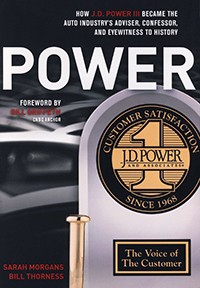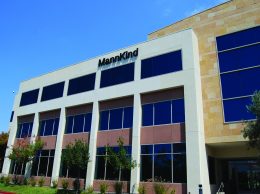New book looks at J.D. Power’s impact on auto industry
When the history of the automotive industry in the 21st Century is written, it will be hard to ignore the long-term influence of J.D. “Dave” Power III and the rankings produced by Westlake Village-based J.D. Power & Associates.
Power’ pioneering efforts to put the consumer in the driver’s seat by measuring customer satisfaction with new vehicles were critical to breaking the manufacturing mindset that dominated the industry for decades — and led to the end of Detroit’s run as the global center of all things automotive.
Power and his J.D. Power & Associates did not arrive at their role by accident. A new book, produced by the Power family, makes clear that from the beginning, giving the customer a voice was the True North for his vision.
What’s also evident, too, is that Dave Power was extremely skilled at delivering bad news to the auto industry bosses in Detroit, Tokyo or Wolfsburg, without blowing up the relationships that made auto makers, car dealers and suppliers essential components of the J.D. Power revenue stream.
Power, now in his 80s and a resident of the Thousand Oaks area, has kept a low profile since he sold the company in 2006 to McGraw Hill. “Power: How J.D. Power III Became the Auto Industry’s Adviser, Confessor and Eyewitness to History,” written by Sarah Morgans and Bill Thornes, is as close as we are likely to get to the official story of how it all happened.
Power, it turns out, was present at an extremely important moment in the evolution of American management practices. After an MBA from the Wharton School of Business at the University of Pennsylvania, he took an assignment for Ford Tractor, analyzing the company’s distribution system.
Later he found his calling in marketing and became one of the first practitioners to apply a disciplined approach to analyzing consumer data. Always a bit of a maverick, he and his wife Julie founded J.D. Power & Associates in Agoura Hills in 1968 and it would be easy to say the rest is history.
But Power had a knack for spotting trends — positive or negative. In the 1970s customer surveys began to pick up a problem with engine failures on the popular Mazda rotary-engine sports cars. It would be early to pick up problems with quality control at Toyota and later Honda’s luxury Acura unit.
When Subaru came knocking looking for advice, Power’s research discovered a niche market for a uniquely four-wheel drive vehicle, something that’s blossomed into a successful vehicle line. Saab never could identify the right market niche and now the brand is history.
And by the 1990s, the New York Times and others were giving Power credit for giving customers and automakers the feedback they needed to make better and much more reliable cars.
There are other moments in the Power story that are equally fascinating. Strong personalities such as Lee Iacocca and Malcom Bricklin get their appearances. There’s a very keen analysis of GM and its structural weaknesses that’s riveting as is the tale of a massive dealer kickback scandal at Honda, where Power winds up on the witness stand.
What’s clear from Power is that Dave Power III clearly understood that the choice of buying a car is informed by lots of factors and that customer satisfaction really is a measure of a buyer’s emotional commitment to the brand — as well as how well the car is made.
That realization is what’s turning the auto industry upside down in the 21st Century are alternative fuels, unique designs and breaking the industry down into tiny niches — creating a whole new world of automotive design and performance.
The rise of Tesla, the bankruptcy and revival of GM and Google’s experiments with self-driven vehicles are beyond the scope of “Power.” But it is possible to argue that the customer and a revolution in technology that’s changing what’s possible are changing the car business in ways that were unimaginable just a decade ago.
To understand how the car business got to where it is today, “Power” is an essential tool.












